#chineseblr
Ài wǒ nǐ jiù bào bào wǒ 爱我你就抱抱我 Pinyin + English #chinese_song_for_kids #pinyin #宝宝巴士 #歌词

Today is the 20th of May (520), China’s unofficial Valentine’s Day!
Do you know any other “number” words?


How I watch YouTube slower for language learning
My plan for improving Chinese this year is more by setting myself daily/weekly habits with my yearly goal in mind, instead of simply having a goal, I am going to attempt to dedicate a certain amount of time to each activity each day for a shrot period, which will accululate over the year instead of going hard and slow at points in the year.
1. Improve active vocabulary and comprehension
- 30m translating EN>CN articles I find online (should I share my notion link with you guys?)
- Reading books in Chinese (slowly) (would you like to see my to read list?)
2. Improve vocabulary
- Anki 10m per day (3x per week, building a habit to 7x week)
3. Improve speaking
- hanging with the roomie (who doesn’t speak English, bonus :)
- Listening to Chinesepods in the morning
4. Improve listening
- Listening to Chinesepods or YT 自媒体新闻 in the morning whilst doing make up (the first thing I do when i work up is urn this on, then my getting ready schedule takes about 30m, I squeeze in a good half hour of study right there… I highly reccomend this as first thing your brain is soo concentrated and easy to absorb info)
Non-language related learning goals
- read books (listening to non-fiction audiobooks whilst walking ANYWHERE)
- study Chinese history (by listening to audiobooks whilst walking)
- spend 1 hr in the morning on any learning project non language related (currently wanting to work on learning marketing/economics)
- podcast news/politics listening (at the gym)
In all honestly this is not many, right?
To update you guys on me, I am currently doing an internship here in China, as well as some on the side tutoring and writing my paper. Hence my study time is non existent except for the above. It’s still possible to squeee in study
WHAT ARE YOUR STUDY GOALS AND HABITS YOU WANT TO FORM THIS YEAR?
Overview:
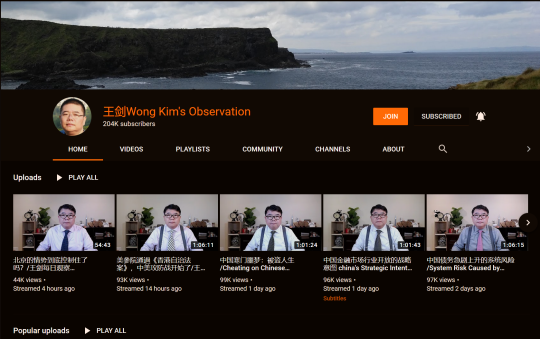
This is a 自媒体 talk show abouteconomy and politics. I really enjoy the format of the videos and Wong Kim speaks very clearly and methodically that his videos keep you interested.
Access the resource:
https://www.youtube.com/channel/UC8UCbiPrm2zN9nZHKdTevZA
Whats good about it?
- Updated twice daily, videos are 1 hour long, the news analysis section is about 30 minutes
- Some videos include subtitlesthat you can select in either English or Chinese
- The format of each video is the same, discussion of a topic and then an analysis of the news and then discussion with viewers at the end. Once you listen to a few videos you’ll become familiar with the format
- Keep up to date with current events as well as improving Chinese.
On a side note:
Whenever you watch news, of course every media outlet has their own stance/position so I encourage everyone to listen widely to differing opinions to really understand Chinese culture/politics (a journey I am currently on too!). Remember the majority of opinions ‘inside the wall’ will be different to those ‘outside’. I will try to share both types of resources. I also will try to share western media that has Chinese news outlets as well as in my recent journey of studying Chinese economy and politics I think listening to all differing voices is very important to form your own understanding!
Overview: This is a talk show that is no longer produced but talked about current topics, even touching on some politics in a casual, relaxed talk show in a free talk format
What good about it?
- interesting topics, related to current affairs
- free talk format
- often in short 2-30 minute segments
Resource link: Go the YouTube channel here:https://www.youtube.com/channel/UCbi-ZrTUyuReTqPpqVGJ8pg
STUDY “ODE TO JOY” WITH JEN WHO BREAKS DOWN EACH SENTENCE LINE BY LINE IN A QUICK AND EFFICIENT WAY TO HELP YOU LEARN CHINESE SPOKEN IN TV SHOWS, [NO INTERSPERSED BITS OF ENGLISH SPOKEN BY THE TEACHER OR TOO MUCH EXPLANATION OR ‘FLUFF’]
What’s good about this resource?
1. Very little English is spoken, as we all know intermediates looking step up to upper-intermediate want as little English as possible when learning.
2. Sentences are repeated several times both in the show and by Jen to help you hear clearly and remember
3. You can almost watch it like a TV show as it cuts each sentence and repeats several times but goes straight back to the TV show and plays the next sentence. There is little ‘fluff’ for example when the teacher says “XXX means YYY” and “if you want to say ZZZ you can say AAAA”. We don’t want this English interspersed in our learning!
4. there is a round up of important points and the end where the teacher speaks a little English and gives extra examples to help clarify new words. this is useful for bridging the intermediate gap or you could skip it because its the same content as the first part.
The full playlist is below:
Hi all. Lately with the virus here in China I have been stuck inside studying. I am also been watching a few new shows in my spare time lately. Here are some of my favourite for intermediate-lower advanced listeners.
Firstly, where can you watch shows?
There are an abundance of places to watch shows, especially within China but you can often find shows on Youtube or on various C/K/J-drama sites outside (though if you can it’s best to watch with only Chinese subtitles).
Tip: If you can’t understand everything, watch once with English subs, and re-watch again with Chinese subs only!
Anyway, on to my list, I have split these between TV series and reality shows:
TV Series
1. 都挺好

This is a story about family life and the burden children may feel of their parents, it reflects modern day Chinese social issues. I really enjoyed this drama
2. 亲爱的,热爱的
I have just started watching this one. It is a love story and the main character became really popular in China last year!

3. 欢乐颂
This is sometimes called the Sex and the City of China, its about working women in the city of Shanghai!

Variety/reality
1. 爱情保卫战
This is one of my favourites! It’s a talk show where two people go on to solve their romantic issues and four ‘experts’ give them advice. Its spoken in very natural Chinese and is very interesting to see people arguing about “He was looking at another girl” or “he has changed since we first met” haha!

2. 非诚勿扰
This is the ‘Take me out’ of China, kinda… It’s essentially the same format without the crude jokes, tho. Sometimes they have foreigners on the show looking for love too.

3. 外国人在中国
This show is good for intermediates as there are foreigners speaking, the level is easier to understand in general and discusses basic things such as daily life. It also can give you a glimpse into people’s lives who are here studying too!
What are you favourite shows? Share them with us below!
When studying a language, I truly think if you want to improve your everyday listening and speaking, watching youtubers/content creators is invaluable.
BTW, you can also find me on HelloTalk (@a_lucie_58910) or instagram (@luc_9999)
Why use Youtubers to study Chinese?
1. They are not creating content specifically for learners of the language, hence they will use the most natural, native language (including chengyus etc.)
2. They chengyus they use will be ones that people use in real life (as opposed to a study resource that attempts to teach you chengyus, its not necessarily a bad thing, you should learn chengyus, but how do you know if they are ones that are commonly used spoken? If you here somebody using it in natural speech you will inevitably know it is one used in every speech. Therefore, you should make note of learning such chengyus. This also applies for grammar patterns and phrases as well. Basically, you wont sound like you learned from a textbook if you learn from native speakers in natural settings
3. The content is interesting. I love lifestyle bloggers, from telling you about a life story to helping their listeners by giving the advice, there is a lot of lengthy content to help you with your listening.
Below are 3 of my favourite Up主 because;
1. A lot of the content is in a simple, natural, chatting to the camera sort of format (just like a friend would chat with you)
2. They use chengyus in a natural way
3. They stories are interesting and relatable (i.e. I am a woman in my mid-20s to 30s as these content creators are. So the content is of interest to me. I am sorry I am unable to share content that is male-oriented. There should be an abundance on Bilibili/YT for you to find if lifestyle isn’t your interest.
1. MsLindaY
I have followed Linda since about 2016 actually, at the time I didn’t understand her videos, even after repeatedly watching them. I would download the audios onto my phone and listen on repeat. It definitely helped and now I can watch the videos, understanding the majority of content. She uses chengyus in a natural way and I have learnt many from her channel. I am eternally grateful for her content actually and have kept meaning to send her an email to thank her for these years of helping me in my Chinese learning journey!
She has a Linda讲故事 series and they are all about 40+ minutes long, GREAT LISTENING MATERIAL! as well us chatty GRWM videos etc. and she has videos that present American culture to her viewers (she lived in the US from her late teens if I do believe).
2. Tracey Chang 翠西
Tracey was a TV host on various Chinese news channels and is bilingual (she grew up in US but is from Beijing). She scatters English in her videos (but not in the annoying way that I see some uploaders… I don’t know why, it grates on me hahaha, but anyway :P)
Her videos are also about chatty GRWMs, videos talking about a certain topic (such as her employment history or what its like to work on Wall Street, or her and her husband’s LDR story). She has just given birth so recently has many videos related to pregnancy and being a mum also!
For me Tracey is very inspiring because she not only creates interesting content, she is bilingual and she is very interested in current affairs and business, she epitomises the ‘working woman’ it shows through her videos.
3. 维多 Vittos
Vittos is a blogger that posts her content mainly on bilibili, she has many long videos that talk about topics related to being a better person, self-care from within and loving yourself etc. to be totally honest, I’m not sure its the sort of content I’d watch in English, but in Chinese its great as, again, its natural language and not too difficult, just like a friend chatting with you. Videos are often up to 20 to 30 minutes long.
The below video is her recounting her study abroad experience in Italy (she speaks Italian!)
(click on the link to go to bilibli below)

https://www.bilibili.com/video/av77109513?t=2120
What are some of your favourite creators? I’d love to know for even more inspiration. Please share so we can learn and improve together :)
Here are recent podcasts I have discovered that I think are suitable for intermediate learners. They are 100% or 99% in Chinese and are suitable to listen when you are on the bus, cleaning your room or eating your dinner (basically, great for studying in that ‘fragmented time’)
Additionally, if you find the RSS code for each podcast you can add it into the Feedly app so you can easily organise in one place and listen on your phone. I can do a tutorial on this if you’d like?
左右汉语 Intermediate Chinese
This podcast is presented by a single host and discusses a new phrase or chengyu in a natural way with many example sentences. It’s good for easy listening whilst learning something useful along the way.
https://podbay.fm/podcast/1195293457
iMandarinPod
This has resources for beginner to lower advanced. It has great dialogues with explanations and new vocab for the intermediate classes. The lower advanced podcasts are in the format of slow news segments, and the transcripts are available. The news segment resource is invaluable and something I’ve not seen elsewhere.
https://podbay.fm/podcast/214936144
Speak Chinese Naturally
This podcast is also in the format with one host and is essentially all in Chinese. Its an ongoing podcast and is updated regularly.
https://podbay.fm/podcast/1459401769
World Languages - discussions on Australia
I podcast that is no longer active, there are about 6 episodes discussing Australian culture in slow Chinese. It perfect for us who already are familiar with western culture but hearing it discussed in Chinese. It is easy to follow and a discussion between two hosts
https://podbay.fm/podcast/250276067
Bonus resource for lower intermediate learners:
Mandarin / English
This is a bilingual podcast (an English native speaks English and a Chinese speaks Chinese). The discussions are interesting and not so ‘boring beginner’ topics that all podcasts discuss and become very samey. For example, one episode discusses Investing. Because there is one host speaking English you can keep up with the more difficult content and makes for easy listening. To be honest, I’d prefer if the Chinese host spoke more but it’s about even, but otherwise its a great podcast all in all.
Hi guys! Here are three websites that are dictionary lists of the latest slang words on Chinese internet (like Chinese urban dictionaries)
Additionally an excellent way to understand a new slang word is to type into Baidu “word + 什么意思”, an explanation almost always comes up, even for the most obscure words. For example, today I look up what “扣1″ means.
Let me know a slang word you have learnt this week? Share it in the comments!!
Btw, I have started an instagram, come and follow me @ chinesestudyblog
https://www.instagram.com/chinesestudyblog
See you there!
1. https://www.chinasmack.com/glossary

2. https://www.lxybaike.com/

3. http://www.thatsmags.com/china/post?tag=Chinese+Urban+Dictionary
(note: this one is in English, more friendly for beginners (and also advanced users also too tbh because I find they seem to have the top/most popular words as opposed to huge lists of words you’d probably never come across - these one’s you will most definitely see used commonly)

Podcasts are simply the best way to squeeze in study time into busy schedules. Doing any sport, doing groceries, walking to/from school and work, extra time can be squeezed in (I always think back to the analogy with the stones, pebbles, sand and water in a cup, remember that post by Hacking Chinese?).
Below is some Intermediate to advanced appropriate listening material. If you have any suggestions don’t hesitate to contact me!
By the way, I am thinking of creating an Instagram account, is that anything you are interested in? Let me know!!
Podcast software/Apps:
Stitcher, Spotify and Ximalaya all have mobile apps and desktop versions for easy syncing.
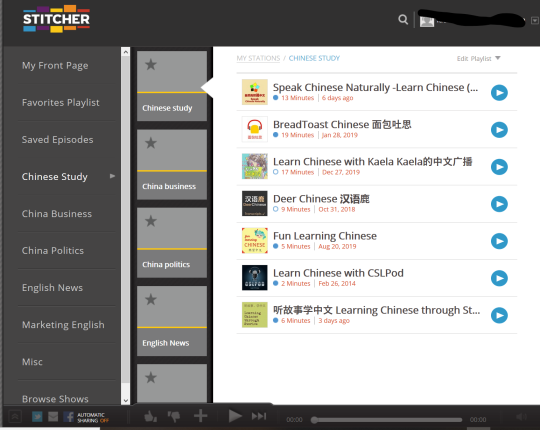
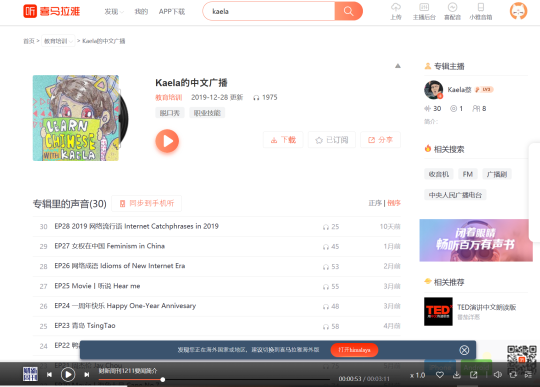

Podcast Shows:
Ximalaya Podcasts:
- 青春逗[this show is presented by two 海归 (Chinese returnees, i.e. two Chinese who have lived abroad and come back to China), therefore they sometimes mix English words within the podcast. It is a contempary topic discussion podcast, spoken in natural language between the two presenters and sometimes a third guest] https://www.ximalaya.com/shishang/18796952/
- Linda讲故事 [naturally spoken language, one person retelling a story, natural and unscripted] https://www.ximalaya.com/qinggan/29392148/
- 健康生活100问 [has a question about nutrition and it answers the question in 3-5 minute short episodes, for example ‘is MSG really bad for health?’, 'which is healthier, cow milk or soy milk?’] https://www.ximalaya.com/jiankang/18734760/
- 故事FM [each episode has a different person come to tell their story about some kind of topic, such as being abused, quitting a 'top school’, and other stories that tell lives of very ordinary people but presents a picture of lives of ordinary chinese people with a story to tell. It’s also spoken in natural, unscripted language with a host] https://www.ximalaya.com/toutiao/7878702/
- 失眠小姐[Short 3-5 minute 'life advice’ to soft background music] https://www.ximalaya.com/qinggan/292190/
- 唐诗三百首 [Learn the 300 Tang Poems] https://www.ximalaya.com/ertong/16479532/
- Kaela的中文广播 Learn Chinese with Kaela [a naturally spoken podcast presented by Kaela, transcripts for the show found at https://gaerdan.wordpress.com/ https://www.ximalaya.com/jiaoyu/16634873/
Stitcher Podcasts:
Simply search the below podcasts in your podcast app
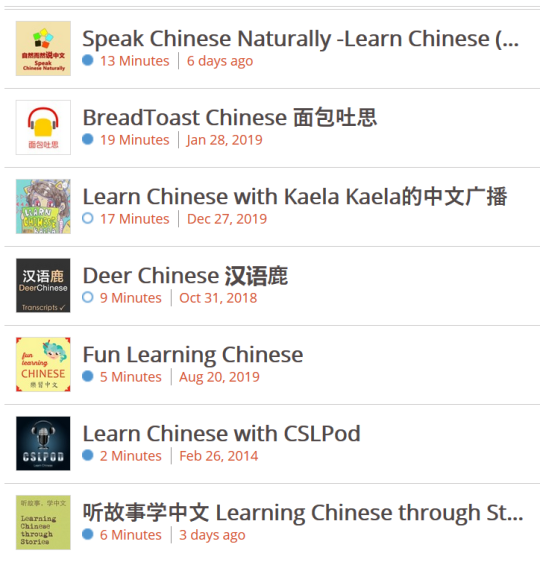
Misc Podcast Websites:
These podcasts you can access through the podcast website (the ones with *s are ones I have used and are very good, its worth spending time on the website, you can download the MP3s to your phone)
o https://www.slow-chinese.com/podcast/*
o http://justlearnchinese.com/mini-novels/
o https://mandarinbean.com/category/advanced/
o http://justlearnchinese.com/category/chinese-short-stories/
Do you have anymore? Please share in the comments!
#4# hacks for vocabulary accumulation
In Chinese.
Recording yourself saying pleco words + listening often
Better yet, get Chinese friend to help you, record yourself or friend saying the Chinese word then English, listen to the recording when on the bus, brushing your teeth and it’s an easy way to memorise vocabulary without having to sit down and write them. Its best used in conjunction with studying the characters as well, however, so you learn how to write and recognise them. I usually do this by playing pleco when I have 2 or 3 minutes here and there. Throughout the way it adds up!
Learn the joint words together
For example 采取 + 措施 / 掩盖 + 错误. It not only helps you remember the word better but also when to use it with which words. For example 掩盖错误 translates to cover up ones mistakes. But in chinese there are many words that can translate to cover up (隐藏 遮盖 etc.) and may be a little confusing as to which one to use. If you learn them together it is easier to use the correct pairing.
Use pleco to record phrases
Pleco is the best vocabulary app. You can also add your own words or phrases if they are not in the dictionary. I often use this feature to help me remember certain phrases
Listen more !!
Listening improves your vocabulary by reinforcing the new words in two ways. Firstly you encounter the word again and helps it become reinforced in your long term memory. Secondly it uses the word in a context that helps you remember the situation in which to use at, and not simply the direct translation. Therefore it can help it become part your your active vocabulary.

I have a list of listening resources On my resources page. I will make an updated comprehensive list for intermediate-advanced learners soon. Stay tuned.
Do you have any other tips? Share them below!
Long time no post! I have been on my course since September, and the first semester was stressful to say the least. Would you guys like a detailed post on my course? I am currently studying enterprise management (企业管理) master course at Qingdao University. Before I started I couldn’t find any other people online/at my uni doing the master course in Chinese… so I had no other people to reference my experience to which I feel would have been helpful. Would you guys like to know about it?
Anyway onto the post…
Below is a preview of my university course notebook. The page you see is where I put an overview of my classes. You can see I have made a note of what study methods to use, info about exams and homework to do. To organise my homework I created a tag called ‘homework’. For each piece of homework I tag it as such. On the right hand panel you can see my tag summary (to open click home > find tags). I then filter to this notebook. I can then see all my tasks tagged 'homework’ from every page and its now organised as a bit to do list.

This is a closer look at the tags summary.
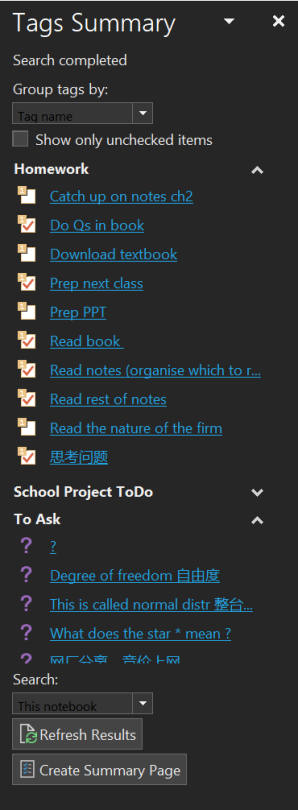
I also have a tag which is called 'to ask’, this tag is used when I come across something I don’t understand and need help. As you can see below I have tagged some words I don’t understand and need clarification. When I next meet my teacher I can simply go to the tags summary and click on each tag that takes me to a different page. This is powerful as you do not need to remember where you got stuck and look in all pages when you meet your teacher for help.

Lastly I have a tag called 'projects’, this is for mini 'projects’ that I want to learn about outside of my course (for example I want to learn some Tang poems, or studying starsigns in Chinese etc.)
Other tag ideas include
· Exam
· Remember for later (if I am in class I need to make a note.. e.g. add vocab to my pleco etc. but don’t have time, I’ll note it and execute after class)
In daily life I use such tags too (in my 'organiser’ notebook). One note doesn’t just organise my studies.. But my whole life! (if anyone would like some posts about organising in general then let me know.. I could make some posts).
Tags include…
· Groceries
· Recipes
· Wishlist
· TV show to watch
If you have any tag ideas let me know in the comments too :D
Hi all
Please see my list of resources and method for listening practice:
Podcast resource links:
Free with transcripts:
*https://www.slow-chinese.com/podcast/
http://justlearnchinese.com/mini-novels/
*https://www.learningchinesethroughstories.com/
Not free:
No transcripts:
Other video resource tips:
YouTube has a lot of individual user content, a bit like the sort of make up tutorial videos you may enjoy or best is users who create those ‘tag’ videos, daily vlogs or ‘story time’ videos… such as the video below. It is best as it is natural, unscripted spoken language.
As a female that’s the sort of content I like to see and I’m sure there is content geared for people who don’t really watch make up videos etc. (if anyone could suggest more ‘male oriented content’ in the comments that would be useful too :)
On YouTube videos you can slow down the speed on the video to x.75 under settings.

Another useful tool for MP3s is an app such as Audiopo which slows down/speeds up mp3 files that you have on your phone (https://play.google.com/store/apps/details?id=jp.ne.sakura.ccice.audipo&hl=en) [see my previous post for a demo].
How to study with the audio/video resources:
I use a similar fashion for studying audios as with reading [see my previous post] and will make a detailed future post. Essentially, I post a transcript and listen several times to the audio (whilst cooking, walking, doing sport etc.) and then read the transcript once I am familiar with the audio, highlight unknown words and add to Anki for my daily vocab review, continue to listen to audios and archive at the end of the week. [I do all this using OneNote and you can see exactly how I use it in my ‘reading’ post!
If you have any useful resources or tips for efficient language learning please feel free to share :D :D
Below I outline steps when I study a new lesson in a course book. Many (at least for chinese) are in the format of - 1. new words, 2. text, 3. grammar notes + exercises, 4. comprehension exercises, 5. speaking/writing task
I thus roughly follow that structure when I study the book.
1. preview new words + add to pleco (or other dictionary that has flashcard system built in)
2. write notes on the book next to vocab if necessary
3. read the text a first time only underlining words I don’t know but don’t look them up
4. go back in and look up the words + add to pleco
5. attempt the comprehension exercises (sometimes I will do this before looking up the unknown vocab for good practice but depends on the difficulty of the text)

6. look up answers and review what was wrong
7. read grammar notes + do the accompanying exercises. sometimes I add a ‘grammar structure’ or phrase or useful example sentence into pleco using the add a custom vocabulary function (e.g. below)

9. read back through the text a last time before moving on
10. outside of the specific blocks of time sitting down with the textbook, when I have a spare few minutes, waiting for the bus etc. I will play on pleco doing drills of the vocabulary added to it that week - see my previous posts on how I study, or check out ‘hackingchinese’ who has an amazing post of finding time with a ‘rock and sand and water’ model.
11. there will of course be times you don’t understand things in the textbook. I suggest you note these down, on onenote as you go along and use your teacher/exchange partner to help explain things you don’t understand.
12. another tip is to listen to the text audios if available - when you are doing other activities such as walking, cooking to squeeze precious study time in.
Do you have any tips you could share on how to learn effectively?
As I will be taking a flight tomorrow morning this post seems quite apt :)
Ideas for study:
- Physical books or readers - make sure it’s not too hard a book that you’ll have to make notes for etc. that is more suited to when you have time and space at a desk
- Audiobooks
- Spaced repetition flashcards - can be done virtually anywhere - For Chinese I use Pleco and Anki, for French I use Anki
- Load up your phone/MP3 with audio material
- Pen + paper - you can write out characters, write a journal etc.
- Read newspaper apps on your phone (the chairmans bao, dushu etc.)
- Laptop with study material you can use offline (or with airport wifi)-
- download videos offline (IQIYI is like a netflix/youtube in China and has an offline download function on the computer and phone app)
- save online grammar wiki pages offline in advance and make notes when out of wifi
- in addition to studying words with flashcard software, I also have exported it to excel and am working on a list of example sentences which a) aids in remembering new vocabulary and b) helps to remember different circumstances it can be used it (I find there are some words I can tell you the English translation but have a hard time using the word myself). Once I have created example sentences I spend time writing these out so I can learn how to write the characters. This is what I shall be doing on the train and at the airport
- NB* make sure your laptop is fully charged for your journey and charge whilst at the airport. Alternatively you can use your phone
I have talked in a previous post about listening to an audio several times to improve listening skills. Another important aspect is slowing down the speed if it is difficult material. You can also speed audios up once you have learnt the new vocab and listened several times (i find this especially good for podcasts aimed at language learners [for example Slow Chinese/慢速中文] as they tend to be slower)
YouTube has a great function for if you want to watch some youtube video creators/TV shows + films but can’t quite listen at full speed.

There are several apps out there that can reduce/increase the speed of audio on your mobile. I currently use Audiopo

